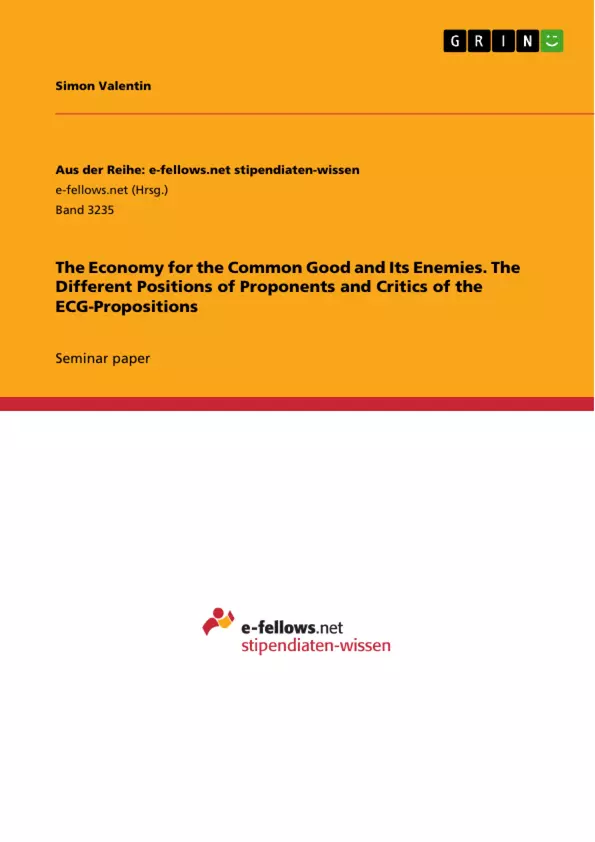At a time at which the persistent socio-economic crisis is increasingly perceived as a systemic, multiple crisis rather than a cyclical one and at which the traditional economic models are called into question, there is a need to develop new models that respond better to the demands of today’s world by promoting a way of fair and sustainable development. This has led to the resurgence of old and the emergence of new alternative streams of thought that contrast the traditional neoclassical paradigm. However, despite the flourishing critical debate over the current form of capitalism and its underlying economic assumptions, concrete alternative economic models are hard to find.
The Economy of the Common Good (ECG), born in Vienna in October of 2010 as a movement of social innovation, is an expression of such a new economic model that places people and the functioning of their relations at the heart of economic activity. Unlike most movements that advocate for a change in the economic system, the ECG does not only have a vague idea of what is going wrong in the current capitalist system but presents a detailed alternative system, that is open for debate. Moreover, besides being an interesting utopia, a still small but growing number of initiatives, individuals, firms, and (local) governments all over the world commit themselves to the ECG and adjust their economic behavior, so that the ECG has also very concrete impacts.
Both, the concrete nature of the propositions as well the happening change at the ground, make the ECG open for attack and lead to the ideas being highly contested. In contrast to most critical social movements that coexist with the orthodox mainstream, the ECG has caused a lot of criticism and resistance from economists and economic interest groups. Since today, the debate is conducted in a polemic and non-scientific way and neither the ECG nor its opponents put their position in a theoretical context, although implicitly drawing on existing ideas of economic philosophy. The debate reveals the often blurred clash of paradigms and normative principles about the governance of the economy within the capitalist society. This paper seeks to exemplify and evaluate this clash with the debate on the ECG and answer the question: How are the different positions of proponents and critics of the ECG-propositions on the governance of the economy informed and driven by economic paradigms?
Inhalt
Introduction
Literature and Theory
Empirics
1. Values
2. Measuring economic success
3. Legal incentives for companies
4. Financial profits
5. Company ownership and cooperation
6. Global cooperation
7. Income and wealth inequalities
8. Working time
9. Protection of nature and ecosystems
10. Direct and participatory bottom-up democracy
Summary
Conclusion
References
Frequently Asked Questions
What is the Economy for the Common Good (ECG)?
The ECG is a social innovation movement born in Vienna in 2010. It proposes an economic model that places human beings and social relations at the heart of economic activity instead of profit maximization.
How does the ECG measure economic success?
Instead of relying solely on financial indicators, the ECG suggests measuring success through contributions to the common good, such as sustainability, social justice, and democratic participation.
Why is the ECG controversial among traditional economists?
It challenges neoclassical paradigms and capitalist assumptions, leading to resistance from interest groups who view its propositions as non-scientific or polemical.
What are the key themes of the ECG propositions?
Key themes include income equality, company ownership cooperation, protection of nature, and direct bottom-up democracy.
Is the ECG just a theoretical utopia?
No, it has concrete impacts as a growing number of individuals, firms, and local governments worldwide have committed to its principles and adjusted their economic behavior.
- Quote paper
- Simon Valentin (Author), 2019, The Economy for the Common Good and Its Enemies. The Different Positions of Proponents and Critics of the ECG-Propositions, Munich, GRIN Verlag, https://www.grin.com/document/497774



